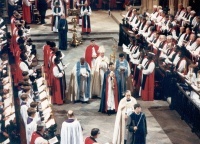c. 2008 Religion News Service
(UNDATED) For centuries, Anglicans have prided themselves on finding the cherished via media _ the middle way _ through theological and political thickets.
But the decades-long debate on homosexuality within the worldwide Anglican Communion seems stuck in a cul-de-sac, many say.
As Anglican bishops from around the world converge on Canterbury, England, for the three-week Lambeth Conference that began Wednesday (July 16), their 77 million-member communion again finds itself at a crossroads.
“The circle has come around again,” said the Rev. Ephraim Radner, a leading North American theologian who is helping draft a new constitution for the communion’s 38 member provinces.
For the communion, the “most important moral authority is the Lambeth Conference _ they are the bishops,” said Radner. “If they’re not up to it, it basically means we can’t function.”
The once-a-decade conference, held at the University of Kent, will draw more than 650 bishops _ including an estimated 135 from the communion’s U.S. branch, the Episcopal Church. Spread across 162 countries, Anglicans trace their common historical and liturgical roots to the Church of England.
Archbishop of Canterbury Rowan Williams, the spiritual leader of the communion who issues invitations to Lambeth, says this year’s conference will feature bridge building, not rule making.
Such rules are of little value, Williams has said, since each of the communion’s 38 autonomous provinces makes and enforces its own laws.
For example, a resolution passed at the last Lambeth Conference, in 1998, called homosexual acts “incompatible with Scripture,” and condemned same-sex relationships.
Five years later, the Episcopal Church elected and consecrated an openly gay priest, V. Gene Robinson, as bishop of New Hampshire. Meanwhile blessings of gay and lesbian couples in Canada and the U.S. continue. Robinson himself joined with his longtime partner in a civil union in June.
To placate conservatives, Williams did not invite Robinson to Lambeth, but the New Hampshire bishop will be in Canterbury anyway to advocate for gay rights.
Conservatives, a powerful bloc in the communion, say the time for “Lambeth’s dithering” is over. They want clear doctrinal standards barring homosexuality, and the power to enforce them. If the U.S. church is not disciplined, the Anglican Communion must be radically rearranged, they say.
“They see this as the very last chance,” said the Rev. Kendall Harmon, a conservative leader from the Diocese of South Carolina. “If the (North American churches) aren’t stopped, the breach won’t be healed.”
Last month, about 280 conservative bishops from Africa, Asia and North America met in Jerusalem and pledged to sideline Williams and the Episcopal Church by creating a powerful new council of archbishops and a new province in the U.S. About 200 of these bishops, mainly from Africa, are boycotting Lambeth, saying they won’t meet with their liberal colleagues.
But this year’s Lambeth Conference has been designed to discourage resolutions that would discipline the U.S and Canada. Small group discussions and a “mind of the communion” document at the conference’s conclusion on Aug. 3 will replace plenary sessions and parliamentary debate.
The Rev. John Peterson, former general secretary of the Anglican Communion, who helped plan the 1998 Lambeth Conference, said a conference without resolutions “has been the desire of every Archbishop of Canterbury, ever.”
But that desire has rarely been fulfilled, Peterson said.
(OPTIONAL TRIM FOLLOWS)
Liberal and moderate Episcopal bishops have their own gameplans for Lambeth. San Francisco Bishop Marc Andrus said part of his mission began on Sunday (July 13) when he explained to fellow bishops gathered at a church in Wales why he supports gay rights.
Amid anti-gay hostility and the spread of AIDS, gays and lesbians “have found the Episcopal Church is one place where they’re welcome,” Andrus said in a telephone interview.
Gay and lesbian advocacy groups, such as Integrity USA, will attend “fringe events,” on the conference’s outskirts. Andrus said that “bishops like myself will be inviting and urging fellows bishops to hear their story.”
Bishop John Bryson Chane of Washington said Anglicans should focus on global missions, including the United Nations’ Millennium Development Goals, which aim to cut poverty, disease and hunger significantly by 2015.
Episcopal bishops will also seek help in stopping overseas archbishops from adopting Episcopal parishes. Dozens of conservative U.S. churches _ and the entire diocese of San Joaquin, Calif. _ have seceded from the Episcopal Church to join more like-minded Anglican provinces.
“Those who are not aware of it will be as offended as we are about this painful disruption and violation of our jurisdictional boundaries,” Chane said.
KRE/LF END BURKE
850 words, with optional trim to 625
Eds: See related stories RNS-LAMBETH-ROME, RNS-LAMBETH-QANDA and RNS-LAMBETH-PLAYERS, all transmitted July 16.
Photos of Williams and the last (1998) Lambeth Conference are available via https://religionnews.com.





